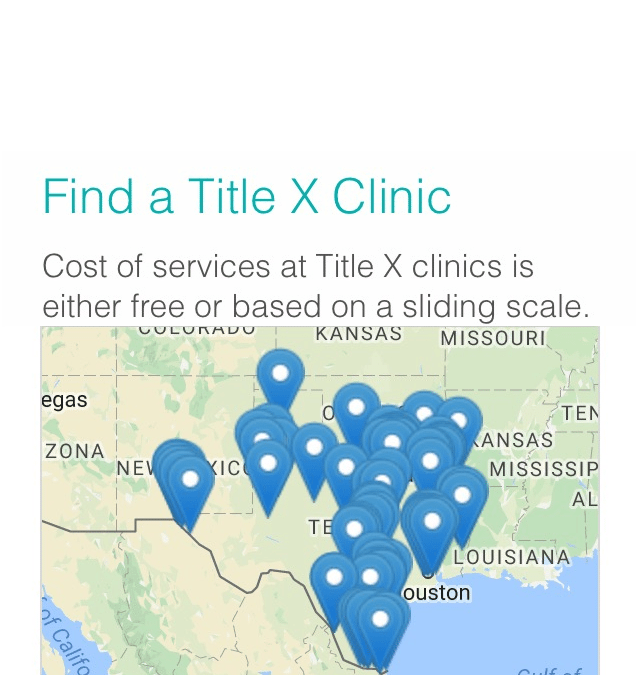*On March 30, 2017, Vice President Mike Pence cast a tie-breaking vote in the Senate on Title X funding. Title X does not fund abortions, but this new measure could mean that organizations that offer abortions at some clinics and preventative services at others, like Planned Parenthood, could no longer receive Title X funding at any of their sites, even the ones that don’t offer abortion. The President signed this bill on April 13, 2017. Every Body Texas is still learning what impact this decision could have in the 2018 funding cycle.*
Title X 101
Recently, you might have heard a lot of commotion in the news about a little thing called Title X (that’s title ten, FYI, not ‘x’). While it’s been around for decades, and impacts millions of people nationwide, not everyone knows exactly what Title X is, or what it does. Basically, Title X supports what we believe in here at JDP — the right to reproductive health and bodily autonomy — so we’d like to give a quick rundown of the program, and why it’s especially relevant to teens.
What is Title X?
Title X is the only federal grant dedicated solely to family planning services. It was signed into life by President Nixon in 1970 as part of the Public Health Service Act, and has since been one of the main funding sources for family planning clinics offering low-cost reproductive health services. These services include affordable birth control, cancer and STD screenings, pregnancy testing, and counseling, among other services. Clinics that get Title X funding are called Title X clinics, and you can get a map of them here.
Title X ensures that those who might not otherwise be able to afford these services have a right to reproductive health care, too. By funding sites across the nation, Title X also helps fill gaps in rural areas where there might not be other health care clinics, working to make reproductive health care accessible to everyone.
For minors looking for contraceptives, or pregnancy and STD testing, but are worried about their parents finding out, Title X clinics are a safe haven. In Texas, Title X clinics are also the only place you can go for confidential care, without needing parental consent. “We certainly encourage parental participation, but we know a lot of teens need access to reproductive care and their parents disagree with that choice,” said Kami Geoffray, CEO of Women’s Health and Family Planning Association of Texas (WHFPT). “This is the only place they can go. We don’t turn you away.” Since 2013, Every Body Texas has served as the only organization in Texas that distributes Title X funds to clinics across the state.
These clinics also offer their services to those who have no income, as well as those without insurance, at low or no cost. For many, this makes Title X clinics vital safety nets. “With such a huge number of uninsured folks in our state, many of them falling far below 100% of the poverty level, Title X clinics are often their only touchpoint to the health care system throughout the year,” says Geoffray.
What services can you get at a Title X clinic?
- BIrth Control
Title X clinics offer all kinds of contraceptive care and plans to keep their patients safe, smart, and protected. During a visit, clinicians will walk patients through different birth control methods, including condoms, pills, implants, shots, IUDs, patches, or rings. Clinics either have the supplies on hand or they can write a prescription for a nearby pharmacy.
- Cancer & STD Screenings and Treatments
Title X clinics offer a wide range of cancer testing and treatments. As reproductive health care centers, the main types of cancer they screen for are cervical, ovarian, breast, and testicular cancer. With regular screenings, health care providers can catch early signs and help treat pre-cancerous changes before they develop into cancer.
Title X clinics also run similar testing for STD screenings – largely through urine samples or blood testing, and prescribe or offer patients treatment. Beyond screenings for STDs, clinics also offer care for things like yeast infections or vaginitis, which are both easily treated.
- Pregnancy Testing & Counseling
As stated by the original Public Health Service Act, Title X clinics are legally obligated to provide true options counseling to any patient who has tested positive on a pregnancy test at their clinic. True options counseling means the counselors must cover all options: parenting, adoption, and termination. While no Title X funding goes towards abortions, clinics must discuss options and offer resources for those interested in terminating their pregnancies.
This is a big difference between Title X clinics and state-run centers, which aren’t bound to the same federal laws and aren’t required to give true options counseling. State-run clinics also aren’t required to offer emergency contraception, such as the morning after pill, and aren’t required to protect patient confidentiality.
Who benefits most from Title X?
While you don’t have to be at or under the poverty line to receive Title X services, these clinics serve mainly those who could not otherwise afford their services. According to National Family Planning and Reproductive Health Association, 66% of Title X patients nationwide are at or below the federal poverty level, and 48% are uninsured.
In Texas, Title X clinics are especially vital for undocumented patients due to their confidential care policies. And due to that same dedication to keeping visits completely confidential, these clinics are also a safe haven to teens who have nowhere else to go without parental consent, but want to stay smart about their reproductive health. In Texas, Title X patients under 19 comprise 14.8% of patients, and those under 25 comprise 37%. Nationwide, a large portion of Title X patients are either black or Hispanic, with 21% of Title X patients identifying as black or African American, and 32% identifying as Hispanic or Latina/o/x.
What can I do to support Title X?
While it’s served the country well for close to half a century, Title X isn’t guaranteed to stay around — in fact, in the current political climate, the program is largely at risk. Even for those who aren’t yet old enough to vote, there’s still a ton you can do to get out there and stand up for Title X:
- Show your love on social media. Follow some of the orgs working with or in support of Title X on Facebook, Twitter, and Instagram:
- Share updates and events on social media and with your friends. Stay up to date on possible legislation against Title X, and share what you learn!
- Contact your representative. It doesn’t matter if you’re old enough to vote or not — if you’re a constituent, it’s important that your representative hears your opinions, too. This is a handy tool to find out who represents you, and how you can contact them. Or, try out Facebook’s new Town Hall tool!
- Support organizations in your town. That means volunteering or even donating if you can. Locate your nearest Title X clinic or an organization working to support Title X, and reach out to see if they could use extra helping hands.
- Go to a Title X clinic. The more people Title X clinics serve, especially patients who are willing to share where they got care, the more people will understand the value of Title X clinics.
- Share your story. As Kami Geoffray says, “If you can talk about how birth control has changed your life on social media and make it real to people, that’s huge.” Tell your friends how birth control has impacted how you live on a daily basis, or how it makes you feel. For Kami, who has an IUD, access to contraception was her ticket to economic freedom — freedom to get a law degree and have a career. What’s your story?



